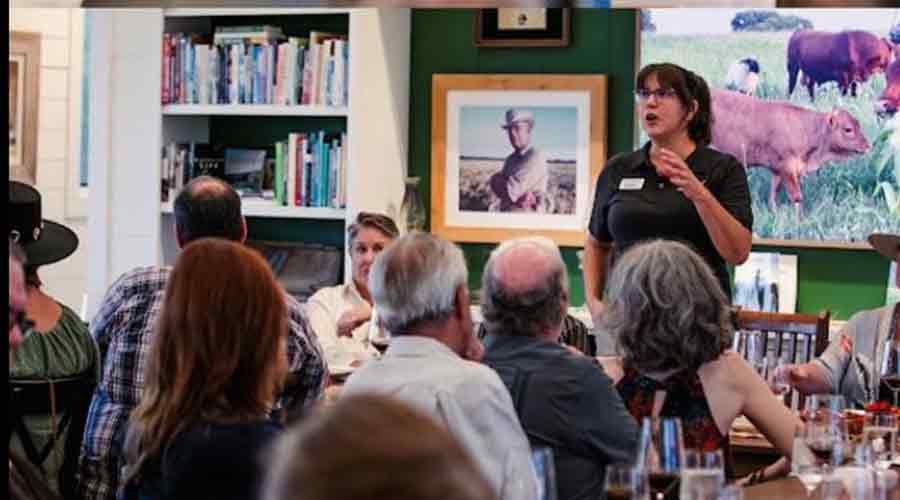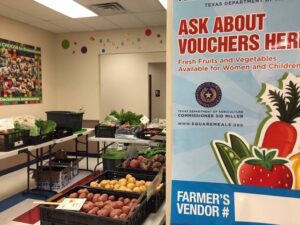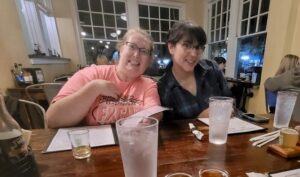
WELL-BEING MATTERS
Brought to you by Texas Health Community Hope
Well-Being Matters is an on-going series highlighting different members of our community and their strategies for well-being. Texas Health Community Hope engages in a broad range of innovative programs, investments, and collaborations outside hospital walls to promote a lifetime of holistic health and well-being. This month we meet Susie Marshall, founder and Executive Director of GROW North Texas, a Dallas-based non-profit that connects North Texans to food, farms and community. Susie grew up in Richardson and says she started working in food and agriculture after an accidental connection to local farmers.
 Q: Tell us how you founded GROW North Texas.
Q: Tell us how you founded GROW North Texas.
A: I founded the organization in 2007 as The Gleaning Network of Texas after I worked to find surplus produce for food assistance programs. I got to know farmers, and I understand the food and food bank system. People need to be able to eat good food – that pulled me in. I discovered the community food movement then shifted the organization’s mission.
Q: GROW North Texas is the logical next step: From moving food across communities to encouraging access to food through agriculture. What does that look like?
A: We need a sustainable local food system where people are involved in growing and buying from local growers. Multiple people growing similar crops creates resilience. When my tomatoes fail, you probably have some tomatoes, so we’re not completely out of tomatoes. Local networks make us stronger as a community and as a society. We need to put the infrastructure back in place to make sure that people have access to food.
Q: People got really interested in food production – or more specifically, supply chain issues – in 2020 but food production continues to be critical. Talk about the work of the farms associated with GROW North Texas.
A: The farms are fairly small, 10 acres or less. Many are in backyards – growing food and selling within their community. And they’re using organic and regenerative practices, which means they’re improving the soil as they’re using it. Which also makes production better. Sometimes it’s a side gig, sometimes it’s someone who wants to make a living growing.
 Q: Just like production is important, access to fresh fruit and vegetables is critical. How are you assisting with that?
Q: Just like production is important, access to fresh fruit and vegetables is critical. How are you assisting with that?
A: We are supporting a system that is rebuilding infrastructure that used to exist before the streamlined industrial food system came along. Farmers markets, farm stands, farm share boxes, and other outlets are crucial for local food access. Local food is fresher and more nutritious, and you’re connected to a local community, which is so important.
Q: Putting advocacy into action, the Fresh Stop Farm Stands link people who receive SNAP and WIC benefits with local producers. Talk about that.
A: We help get local produce to families with access challenges by setting up farm stands at WIC clinics in Dallas. Pregnant moms and families with small children in the Dallas WIC program can take advantage of the WIC Farmers Market Nutrition Program, which is a voucher program that benefits the family, as well as the grower.
Q: Tell us about Owenwood Farm, which is transforming the former Owenwood United Methodist Church into a community gathering space and farm.
A: Owenwood is still owned by the United Methodist Church but the property is being repurposed. The building is used by multiple organizations. The farm has about an acre in fruit and vegetable production and a 40-tree fruit orchard. We currently have apple, pear, peach, plum, pomegranate, and fig trees, along with blackberries and jujubes. The farm will be about three acres when fully built out.
Q: Jujubes are exotic for the area. They’re round with a pit, kind of like a plum. What do you do with those?
A: You can eat them fresh or dried as a sweet treat.
 Q: On the GROW North Texas website, you talk a little about access to culturally appropriate food.
Q: On the GROW North Texas website, you talk a little about access to culturally appropriate food.
A: Culturally appropriate food is food that someone is familiar with based on their upbringing. It’s important to have or facilitate production of produce that’s familiar to a variety of cultural backgrounds. We want people to eat food they’re familiar with and know how to cook.
Q: What are the Giving Grove Community Orchards?
A: The Giving Grove works with community organizations to install and steward fruit tree orchards. Currently we have a network of 50 orchards hosted by community organizations. We provide the expertise and support to help the organization manage it in return for an agreement that 50% of the fruit is given away. The community organizations decide where it goes; it could be a church food pantry, a school or open to the public.
Q: On your website, you have an interesting list of resources for urban farmers and makers – everything from cottage business law to assistance for urban agriculture.
A: These resources are a result of education we provide for new and beginning farmers. Farm Success educates new and beginning farmers and provides technical assistance – from production planning to business management — so we can have more people growing food.
Q: Talk a little about the volunteer opportunities with Owenwood Farm.
A: We love volunteer groups or individuals to help at the farm. Every second Saturday of the month there’s an opportunity to volunteer. Learn more about that and everything else GROW North Texas does at grownorthtexas.org.
Learn more about Texas Health Community Hope at TexasHealth.org/CommunityHope
